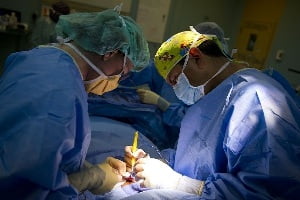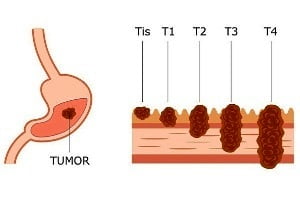Stomach Cancer Surgery
- Updated on: Jul 23, 2024
- 3 min Read
- Published on Dec 14, 2018

Know about Stomach cancer
If a person suffers from persistent indigestion and heartburn or trapped wind, frequent burping, bloating, persistent stomach pain, blood in feces, frequent weight loss, loss of appetite, etc, he should be concerned. While not always, but these conditions could be symptoms of a chronic stomach disease, particularly if they are persistent. One of these serious and concerning conditions is stomach cancer, in particular, when a person is at risk of some type of cancer.
Stomach cancer is also referred to as gastric cancer and may develop in any part of the stomach or its nearby areas. Tumor in the stomach may grow along the stomach wall into the esophagus or to the small intestine. People above 60 years of age are at a higher risk of developing stomach cancer. There are several risk factors such as helicobacter pylori infection, obesity, family history, tobacco or alcohol consumption, etc that can be associated with stomach cancer. However, what exactly causes gastric cancer is still unknown. Read about causes and risk factors of stomach cancer.
Stomach cancer surgery: A primary treatment method
Stomach cancer, in most cases, initiates in the mucus-producing cells that line the stomach. Doctors might recommend certain diagnostic tests if the stomach cancer symptoms are causing excess problem or discomfort to the patient. Blood tests, endoscopy, CT scan, upper GI series test, biopsy, etc are suggested tests to detect or to eliminate the risk of stomach cancer.
According to NHS, UK, if stomach cancer is detected in its early stage, surgery is recommended as a primary option but if the cancer is diagnosed at an advanced stage, chemotherapy and radiotherapy can also be additionally used during the treatment.
Types of surgeries for treating stomach cancer
Stomach cancer can metastasize in the stomach and to other nearby organs. Type of surgery is dependent on the stage of stomach cancer.
Endoscopic resection
Endoscopic mucosal resection and endoscopic sub-mucosal resection is a method to remove tumors for very early-stage cancers. In this procedure, no cut (incision) is made in the skin, but the surgeon passes an endoscope down the throat and into the stomach to remove the affected area. This method is recommended when the risk of metastasis to the nearby lymph nodes is very low.
Subtotal (partial) gastrectomy
This surgical procedure is recommended for stage 2 stomach cancer patients when the tumor is mainly found in the lower part of the stomach, and sometimes in the upper part of the stomach. In some cases, a part of the esophagus or the duodenum is also removed, if affected.
Total gastrectomy
It is type of gastric cancer surgery recommended in later stages (for stage 3). During total gastrectomy, it is preferable to remove the entire stomach, nearby lymph nodes, and omentum. Spleen and parts of the esophagus, intestines, pancreas, or other nearby organs are also removed in several cases. During the procedure, when the infected stomach is removed, the esophagus is attached to a part of the small intestine which allows the food to directly move down the intestinal tract. For stage 4 patients, surgery is not a recommended treatment for stomach cancer.
Stomach cancer survival rate after surgery: Outlook
According to National Cancer Institute, patients undergoing surgery for stomach cancer had higher survival rates than those who underwent other therapies. It was estimated that the stomach cancer surgery survival rate for stage 1 was more than 75%, while five-year stomach cancer survival rate after the surgery for stage IV stomach cancer reduced to up to 4%.
According to data provided by the American cancer society, the 5-year stomach cancer surgery survival rate is as follows:
- Stage I gastric cancer survival rate is estimated to be about 90%.
- Stage II average survival rate is about 70%
- Stage III average survival rate after stomach cancer surgery is 35%
While recovering from gastric cancer surgery, a person might suffer from some side effects such as nausea, heartburn, abdominal pain, and diarrhea, particularly after eating. In recent years, surgical techniques have consistently improved and only about less than 2% of patients might die during the surgery for stomach cancer.












